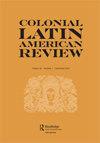Trumped by politics: Pedro Antonio de Cossío, the merchant who ruled New Spain
IF 0.4
2区 历史学
Q1 HISTORY
引用次数: 0
Abstract
The Anglo-Spanish war of 1779–1783 within the context of the American Revolution challenged New Spain more intensely than previous imperial wars. As never before, the Spanish Crown pressured its wealthiest viceroyalty to financially support the war effort. The rule of interim viceroy Martín de Mayorga coincides with those critical years, but another figure, Pedro Antonio de Cossío, was the person in charge of controlling New Spain’s finances. Cossío’s brief tenure as superintendente de real hacienda (superintendent of the royal treasury) was anomalous in many senses and, for that reason, historians have misunderstood it. First, the Crown justified his tenure as a war emergency measure, but his appointment was a direct assault on the viceregal office as it dispossessed the incumbent viceroy from all his administrative economic powers. Cossío effectively displaced Mayorga as the main decision maker in the viceroyalty. Second, his position was secret, known only to four persons, including Cossío. To mask his covert office, the Crown appointed him publicly to the posts of intendente del ejército (army intendant) and secretary to the viceroy. Third, in addition to being an experienced royal official, Cossío was a rich transatlantic merchant. His contemporaries observed how a businessman now had equal or more power than the viceroy and began to denounce him as a corrupt despot. The perceived erasure of a line between the public and the private at such a high level of government led to Cossío’s political disgrace through a series of scandals and coordinated attacks from Bourbon reformers like him who accused him of favoritism toward his paisanos (fellow countrymen) and of creating a state-run monopoly of wheat trade that benefitted his family’s merchant house. His abrupt fall from power did not matter to the Crown, however, because the merchant-bureaucrat had served his purpose. While in power, the ruthlessly efficient Cossío orchestrated the collection and shipment out of the viceroyalty of tens of millions of silver pesos that sealed Britain’s military defeat in 1783. Moreover, at a time of great social discontent in Spanish America, Cossío had forced economic growth and drained the viceroyalty’s finances without provoking popular upheavals. Cossío’s virtual rule of New Spain has not entirely eluded the eye of historians, but his fall from power has served as a distraction for scholars who rush to dismiss his administrative role in the 1779–1783 period as merely an aberration. He is judged as ‘talented but erratic’ (Deans-Smith 1992, 83); inflexible, rude, and psychologically impaired to do被政治打败:Pedro Antonio de Cossío,统治新西班牙的商人
在美国独立战争的背景下,1779年至1783年的英西战争对新西班牙的挑战比以往的帝国战争更强烈。西班牙王室前所未有地向其最富有的总督施压,要求他们在财政上支持战争。临时总督Martín de Mayorga的统治与那些关键年份相吻合,但另一个人物Pedro Antonio de Cossío负责控制新西班牙的财政。Cossío作为皇家财政主管的短暂任期在很多方面都是不寻常的,因此,历史学家对其产生了误解。首先,国王将他的任期正当化为战争紧急措施,但他的任命是对总督办公室的直接攻击,因为它剥夺了现任总督的所有行政经济权力。Cossío有效地取代了马约尔加成为总督辖区的主要决策者。其次,他的职位是秘密的,只有四个人知道,包括Cossío。为了掩饰他的秘密职务,国王公开任命他为陆军司令和总督秘书。第三,Cossío除了是一位经验丰富的皇室官员外,还是一位富有的跨大西洋商人。他的同代人注意到一个商人现在拥有与总督相等甚至更多的权力,并开始谴责他是一个腐败的暴君。在如此高层的政府中,公共和私人之间的界限被抹去,这导致Cossío在政治上的耻辱,因为一系列的丑闻和波旁派改革者(如他)的协同攻击,他们指责他偏袒他的同胞,并创造了一个国家垄断的小麦贸易,使他的家族商人受益。然而,他的突然下台对王室来说并不重要,因为这位商人官僚已经达到了他的目的。在掌权期间,冷酷高效的Cossío精心策划了数千万银币的收集和运出总督府,这导致了1783年英国的军事失败。此外,在西属美洲社会极度不满的时期,Cossío在没有引发民众动荡的情况下,推动了经济增长,榨干了总督的财政。Cossío对新西班牙的实际统治并没有完全躲过历史学家的目光,但他的下台分散了学者们的注意力,他们急于将他在1779年至1783年期间的行政角色视为一种失常。他被评价为“有天赋但不稳定”(迪恩-史密斯1992,83);顽固的,粗鲁的,心理上有缺陷的
本文章由计算机程序翻译,如有差异,请以英文原文为准。
求助全文
约1分钟内获得全文
求助全文
来源期刊

Colonial Latin American Review
HISTORY-
CiteScore
0.60
自引率
25.00%
发文量
25
期刊介绍:
Colonial Latin American Review (CLAR) is a unique interdisciplinary journal devoted to the study of the colonial period in Latin America. The journal was created in 1992, in response to the growing scholarly interest in colonial themes related to the Quincentenary. CLAR offers a critical forum where scholars can exchange ideas, revise traditional areas of inquiry and chart new directions of research. With the conviction that this dialogue will enrich the emerging field of Latin American colonial studies, CLAR offers a variety of scholarly approaches and formats, including articles, debates, review-essays and book reviews.
 求助内容:
求助内容: 应助结果提醒方式:
应助结果提醒方式:


